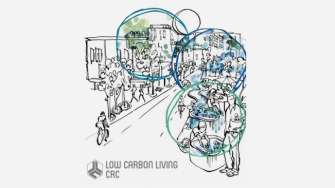Program 3: Engaged Communities

There is a strong nexus between water and energy. Water is required to produce energy, particularly electricity, and energy is consumed in providing vital urban water and wastewater services to cities and towns across Australia. Most energy in the urban water cycle is used to heat water for residential and commercial applications. Therefore, water demand management can significantly reduce overall urban energy use and carbon footprint.
This project will build upon the outputs of RP3002 and RP3028 by adapting the agent based modelling framework developed in these projects to understand the complex processes and cumulative impact of behavioural rules within a social network, in response to intervention options to promote the uptake of water conservation and efficiency measures.
The project brings together CSIRO’s capabilities in simulating social processes and technological forecasting to accommodate the complex variables associated with consumer behaviour and Sydney Water’s data sets and research associated with water conservation and efficiency to evaluate chosen policy and behavioural change programs, to reduce urban water and wastewater impacts on energy usage, and the associated carbon emissions.
Magnus Moglia, CSIRO
Complete
05/2017 to 05/2018
- Publications
- Partners
Peer Reviewed Research Publications
RP3035: Journal Article: Transformative Approaches for Sustainable Water Management in the Urban Century
Sustainable Urban Water Management (SUWM) approaches highlighted in this special issue have the potential to contribute to the transformation of urban water systems. The aim of the transformation is to accommodate population and economic growth and at the same time enable a system which is environmentally sustainable and resilient to future challenges such as climate change. These approaches have increasingly entered mainstream dialogue over the last ten years as knowledge on the approaches has developed, and there is an acceptance that there needs to be a change to how urban water systems are designed and operated. However, there are still a range of aspects of these approaches that are maturing and require further research to realize the objectives of SUWM.
The issue explored supply-side interventions, such as rainwater harvesting and stormwater harvesting, demand-side interventions, and water storage solutions that have the potential to enable a range of recycling technologies. The issue also highlighted a novel method for better managing the integrity of a conventional sewer system. Furthermore, there are articles that explore methods for integrated assessments, integrated decision making and an exploration of what factors may promote community adoption of technology.
RP3035: Journal Article: Willingness to pay for rainwater tank features: a post-drought analysis of Sydney Water users
The Millennium Drought across Australia during the 2000s placed cities under pressure in providing urban water security. In Sydney, Australia’s largest city, a comprehensive water demand programme triggered a significant reduction in per capita water consumption. The water demand programme included incentives for the installation of rainwater tanks.
This paper explores the willingness to pay (WTP) for rainwater tank features in the post-drought context. Rainwater tanks have been demonstrated as an effective measure to reduce mains water demand, but they also provide broader environmental and economic benefits, such as the reduction of urban runoff to waterways and deferred capital investment in augmenting capacity of water supply system. Therefore, there is the need to better understand WTP for rainwater tank features across the community. An online survey was administered to a sample of Sydney households, with 127 respondents completing a rainwater tank choice experiment that explored their WTP for different rainwater tank features and the socio-psychological constructs that might influence their tendency to adopt rainwater tanks.
The results demonstrated that householders surveyed valued slimline rainwater tanks, as they are likely to be less obstructive, particularly given the trend for smaller lot sizes and increased building size. Householders also placed greater value on connecting the rainwater tank to outdoor demands, which may be influenced by perceived vulnerability of outdoor uses to water restrictions relative to indoor uses. The survey analysis also identified that the householders most receptive to installing a rainwater tank are likely to be conformists, who compare themselves to peers, and spend significant effort when making decisions, and are already taking actions to conserve water. The findings are of significance when targeting future education programmes and designing financial incentives to encourage rainwater tank adoption.
https://apo.org.au/sites/default/files/resource-files/2018/09/apo-nid256871-1384156.pdf
RP3035: Journal Article: Promoting water conservation: where to from here?
This paper reports on a review of international water conservation efforts, but with a particular focus on the Australian context. The aim is to take stock of the current understanding of water conservation, what influences people’s decision to conserve water, what influences whether people persist with water conservation behaviour and what contributes to awareness and familiarity of water conservation behaviours.
https://apo.org.au/sites/default/files/resource-files/2018/10/apo-nid220046-1332086.pdf
CRCLCL Project Reports
RP 3035: Final Report: Modelling Uptake of Water Conservation and Efficiency Measures in Sydney
The Modelling the Uptake of Water Conservation and Efficiency Measures in Sydney report team worked with Sydney Water’s WaterFix Program to validate their agent based, decision-making model aimed at encouraging consumers to participate in water saving programs.
Customer behaviour plus the development and adoption of water efficient appliances were identified as the two biggest uncertainties in estimating long-term demand for water. The team used data from the WaterFix program collected during the Millennium Drought (2001-2009) and applied it to their model, replicating Sydney householder decision-making at the time. The modelling is hoped to contribute to future water supply resilience for Sydney at a time of declining dam inflows and increasing population.
CRC LCL report water conservation sydney (1423221 PDF)
RP3035: Workshop and Progress Report
This brief report provides notes from a workshop that was organised by CSIRO and Sydney Water. The aim of the workshop was to explore the potential uses of the Agent-Based Model describing water conservation behaviour.
RP3035 may 2018 workshop and progress report (666926 PDF)
Fact sheet
RP3035 FACTSHEET: Using Agent Based Modelling to Identify Effective Water Conservation Policies
RP3035: Factsheet - Using Agent Based Modelling to Identify Effective Water Conservation Policies (868508 PDF)